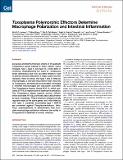Toxoplasma Polymorphic Effectors Determine Macrophage Polarization and Intestinal Inflammation
Author(s)
Jensen, Kirk D. C.; Wang, Yiding; Wojno, Elia D. Tait; Shastri, Anjali J.; Hu, Kenneth; Cornel, Lara; Boedec, Erwan; Ong, Yi-Ching; Chien, Yueh-hsiu; Hunter, Christopher A.; Boothroyd, John C.; Saeij, Jeroen; ... Show more Show less
DownloadJensen-2011-Toxoplasma Polymorph.pdf (1.321Mb)
PUBLISHER_POLICY
Publisher Policy
Article is made available in accordance with the publisher's policy and may be subject to US copyright law. Please refer to the publisher's site for terms of use.
Terms of use
Metadata
Show full item recordAbstract
European and North American strains of the parasite Toxoplasma gondii belong to three distinct clonal lineages, type I, type II, and type III, which differ in virulence. Understanding the basis of Toxoplasma strain differences and how secreted effectors work to achieve chronic infection is a major goal of current research. Here we show that type I and III infected macrophages, a cell type required for host immunity to Toxoplasma, are alternatively activated, while type II infected macrophages are classically activated. The Toxoplasma rhoptry kinase ROP16, which activates STAT6, is responsible for alternative activation. The Toxoplasma dense granule protein GRA15, which activates NF-κB, promotes classical activation by type II parasites. These effectors antagonistically regulate many of the same genes, and mice infected with type II parasites expressing type I ROP16 are protected against Toxoplasma-induced ileitis. Thus, polymorphisms in determinants that modulate macrophage activation influence the ability of Toxoplasma to establish a chronic infection.
Date issued
2011-06Department
Massachusetts Institute of Technology. Department of BiologyJournal
Cell Host and Microbe
Publisher
Elsevier
Citation
Jensen, Kirk D.C., Yiding Wang, Elia D. Tait Wojno, Anjali J. Shastri, Kenneth Hu, Lara Cornel, Erwan Boedec, et al. “Toxoplasma Polymorphic Effectors Determine Macrophage Polarization and Intestinal Inflammation.” Cell Host & Microbe 9, no. 6 (June 2011): 472–483. © 2011 Elsevier Inc.
Version: Final published version
ISSN
19313128